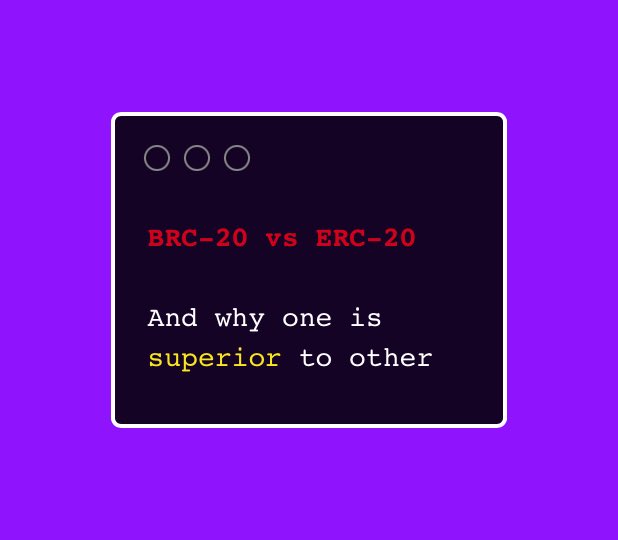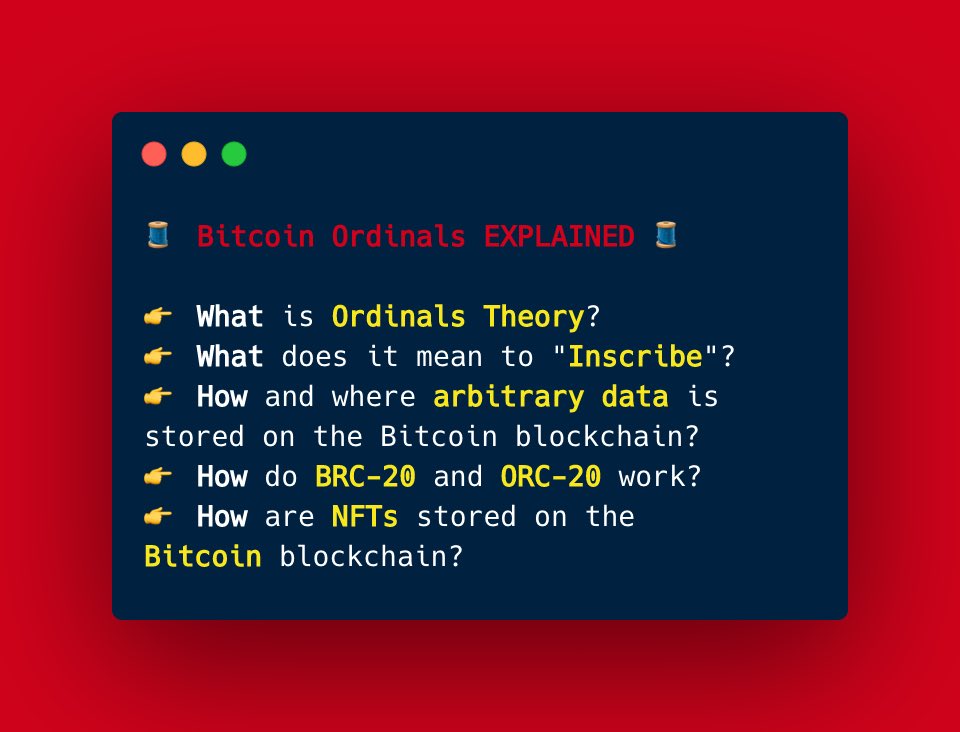
⬇️ My Thoughts ⬇️
🌐 In conclusion, it's essential to understand the technical and operational differences between BRC-20 and ERC-20. While the ecosystem around BRC-20 will continue to evolve, it is unlikely that it will supersede smart-contract based DeFi

📚 A detailed explanation of what BRC-20 are and how they work can be found on this thread:
https://illya.sh/threads/@1684348771-1.html
BRC20 Ordinals Inscriptions Bitcoin
📚 A detailed explanation of what BRC-20 are and how they work can be found on this thread:
https://illya.sh/threads/@1684348771-1.html
BRC20 Ordinals Inscriptions Bitcoin

🚀 BRC-20 is also less efficient than ERC-20. Any mildly complex system built around BRC-20 heavily relies on caching. In contrast, ERC-20 is extremely efficient, cryptographically protected, and operates seamlessly on the blockchain
🚀 BRC-20 is also less efficient than ERC-20. Any mildly complex system built around BRC-20 heavily relies on caching. In contrast, ERC-20 is extremely efficient, cryptographically protected, and operates seamlessly on the blockchain

🛠️ Any DeFi ecosystem built around BRC-20 will need off-chain tools. This requirement brings in a level of centralization and potential vulnerability. On the other hand, with ERC-20, everything is fully stored and operated on the blockchain
🛠️ Any DeFi ecosystem built around BRC-20 will need off-chain tools. This requirement brings in a level of centralization and potential vulnerability. On the other hand, with ERC-20, everything is fully stored and operated on the blockchain

🚧 Contrary to popular belief, BRC-20 isn't fully on the Bitcoin blockchain. Yes, the text is stored as part of Taproot Bitcoin transactions, but Bitcoin isn't aware of BRC-20s. You need an external, off-chain tool to parse and calculate balances
🚧 Contrary to popular belief, BRC-20 isn't fully on the Bitcoin blockchain. Yes, the text is stored as part of Taproot Bitcoin transactions, but Bitcoin isn't aware of BRC-20s. You need an external, off-chain tool to parse and calculate balances

🪙 BRC-20 doesn't limit the minting of tokens. There is no way of knowing wether a token has been fully minted without parsing every “mint” text record. Conversely, ERC-20 ensures that only a predetermined amount of a token can exist, providing a more controlled ecosystem.
🪙 BRC-20 doesn't limit the minting of tokens. There is no way of knowing wether a token has been fully minted without parsing every “mint” text record. Conversely, ERC-20 ensures that only a predetermined amount of a token can exist, providing a more controlled ecosystem.

📝 With BRC-20, there are no numeric balances. Instead, you need to parse everything from the text. In contrast, ERC-20 gives each address an integer balance, simplifying and enforcing the proper handling of assets
📝 With BRC-20, there are no numeric balances. Instead, you need to parse everything from the text. In contrast, ERC-20 gives each address an integer balance, simplifying and enforcing the proper handling of assets

🤔 It's crucial to understand what these tokens are. BRC-20 is essentially a piece of text, whereas ERC-20 is a computer program. BRC-20's capabilities are limited to inscription on the blockchain. ERC-20, on the other hand, allows encoding of any execution logic
🤔 It's crucial to understand what these tokens are. BRC-20 is essentially a piece of text, whereas ERC-20 is a computer program. BRC-20's capabilities are limited to inscription on the blockchain. ERC-20, on the other hand, allows encoding of any execution logic
🚀 Debunking a common misconception in the Crypto world: BRC-20 superiority over ERC-20
If you've heard BRC-20 is better, let's dive into some facts that might make you rethink that claim
📚 Remember, inscriptions are still an experimental feature, so exercise caution when working with them
🎯 Keep in mind that transaction fees and the size of the inscription can affect costs. As the inscription size increases, so does the transaction size, potentially impacting fees required for inclusion in a block

🖼️ Inscriptions demonstrate the versatility of the Bitcoin blockchain, enabling storage of arbitrary data. From artwork to text, the possibilities are endless. Ordinal Theory opens new avenues for creativity and innovation on the blockchain.
🖼️ Inscriptions demonstrate the versatility of the Bitcoin blockchain, enabling storage of arbitrary data. From artwork to text, the possibilities are endless. Ordinal Theory opens new avenues for creativity and innovation on the blockchain.

🛠️ Meet the ord tool! It serves as an index, block explorer, and wallet for exploring the world of inscriptions. With ord, you can generate, manage, and interact with your own inscriptions on the Bitcoin blockchain
🛠️ Meet the ord tool! It serves as an index, block explorer, and wallet for exploring the world of inscriptions. With ord, you can generate, manage, and interact with your own inscriptions on the Bitcoin blockchain

🔒 When an address becomes the owner of an inscription on the Bitcoin blockchain, it gains the ability to transfer that inscription. This ownership is secured and verified by the Bitcoin network itself
🔒 When an address becomes the owner of an inscription on the Bitcoin blockchain, it gains the ability to transfer that inscription. This ownership is secured and verified by the Bitcoin network itself

🗂️ So, how does arbitrary data get stored on the Bitcoin blockchain using ordinals? Inscription content is serialized and included in the input of a reveal transaction, giving life to new forms of digital artifacts
🗂️ So, how does arbitrary data get stored on the Bitcoin blockchain using ordinals? Inscription content is serialized and included in the input of a reveal transaction, giving life to new forms of digital artifacts

🌱 Taproot addresses play a crucial role in enabling inscriptions. They leverage the power of the Taproot upgrade on the Bitcoin blockchain, providing the necessary flexibility to store arbitrary content within a transaction
🌱 Taproot addresses play a crucial role in enabling inscriptions. They leverage the power of the Taproot upgrade on the Bitcoin blockchain, providing the necessary flexibility to store arbitrary content within a transaction

🔍 We can track a single satoshi using these inscriptions. This allows us to trace its journey across transactions, from one taproot address to another. The first satoshi of the first output becomes the vessel for the inscription
🔍 We can track a single satoshi using these inscriptions. This allows us to trace its journey across transactions, from one taproot address to another. The first satoshi of the first output becomes the vessel for the inscription

📝 An inscription is an arbitrary piece of data attached to an individual satoshi, transforming it into a Bitcoin-native digital artifact. It's like a digital signature, representing something unique and valuable
📝 An inscription is an arbitrary piece of data attached to an individual satoshi, transforming it into a Bitcoin-native digital artifact. It's like a digital signature, representing something unique and valuable

🧠 Ordinal Theory assigns serial numbers to satoshis, the smallest unit of Bitcoin. These ordinal numbers are assigned in the order satoshis are mined, giving each a unique identity and opening the door to a world of possibilities
🧠 Ordinal Theory assigns serial numbers to satoshis, the smallest unit of Bitcoin. These ordinal numbers are assigned in the order satoshis are mined, giving each a unique identity and opening the door to a world of possibilities
What if I told you that Bitcoin is not just about money, but it can also store arbitrary data?
In this thread I will explain in detail the fascinating world of Ordinals and Inscriptions, where individual satoshis become more than just digital currency
🌍 In conclusion, the Ordinal Protocol on Bitcoin opens up new possibilities for tracking, trading, and collecting satoshis, as well as creating digital artifacts. It's a valuable addition to the blockchain ecosystem! 🌟🌊

👩🎨 Why inscriptions matter for artists: They're on Bitcoin (high status), have cheaper on-chain storage, unlock new liquidity, and are designed specifically for digital artifacts. This offers unique advantages compared to other NFT platforms. 🎭🚀
👩🎨 Why inscriptions matter for artists: They're on Bitcoin (high status), have cheaper on-chain storage, unlock new liquidity, and are designed specifically for digital artifacts. This offers unique advantages compared to other NFT platforms. 🎭🚀

🧪 Comparisons to other platforms: Ordinal Protocol has been designed specifically for digital artifacts, offering a simpler and more polished user experience compared to second-layer asset protocols like RGB and Taro. 🖼️🌟
🧪 Comparisons to other platforms: Ordinal Protocol has been designed specifically for digital artifacts, offering a simpler and more polished user experience compared to second-layer asset protocols like RGB and Taro. 🖼️🌟

⚠️ The key differences between Ordinal Theory's inscriptions and Ethereum NFTs:
- Inscriptions are always immutable🔏
- Content is always on-chain💾
- Inscriptions are simpler and more secure🛡️
- They're scarcer, unlocking new markets💰
⚠️ The key differences between Ordinal Theory's inscriptions and Ethereum NFTs:
- Inscriptions are always immutable🔏
- Content is always on-chain💾
- Inscriptions are simpler and more secure🛡️
- They're scarcer, unlocking new markets💰

🧩 How does it work? Ordinal numbers are assigned to satoshis as they're mined. A simple algorithm is used to determine how satoshis move from inputs to outputs in transactions, maintaining their unique identities. 💹🔀
🧩 How does it work? Ordinal numbers are assigned to satoshis as they're mined. A simple algorithm is used to determine how satoshis move from inputs to outputs in transactions, maintaining their unique identities. 💹🔀

🔑 The power of Ordinal Theory: Collecting, trading, and scheming!🤝 By assigning identities to satoshis, they become individually trackable and tradable for numismatic value. Plus, it enables inscriptions: a protocol to attach content to satoshis! 🎨🔐

